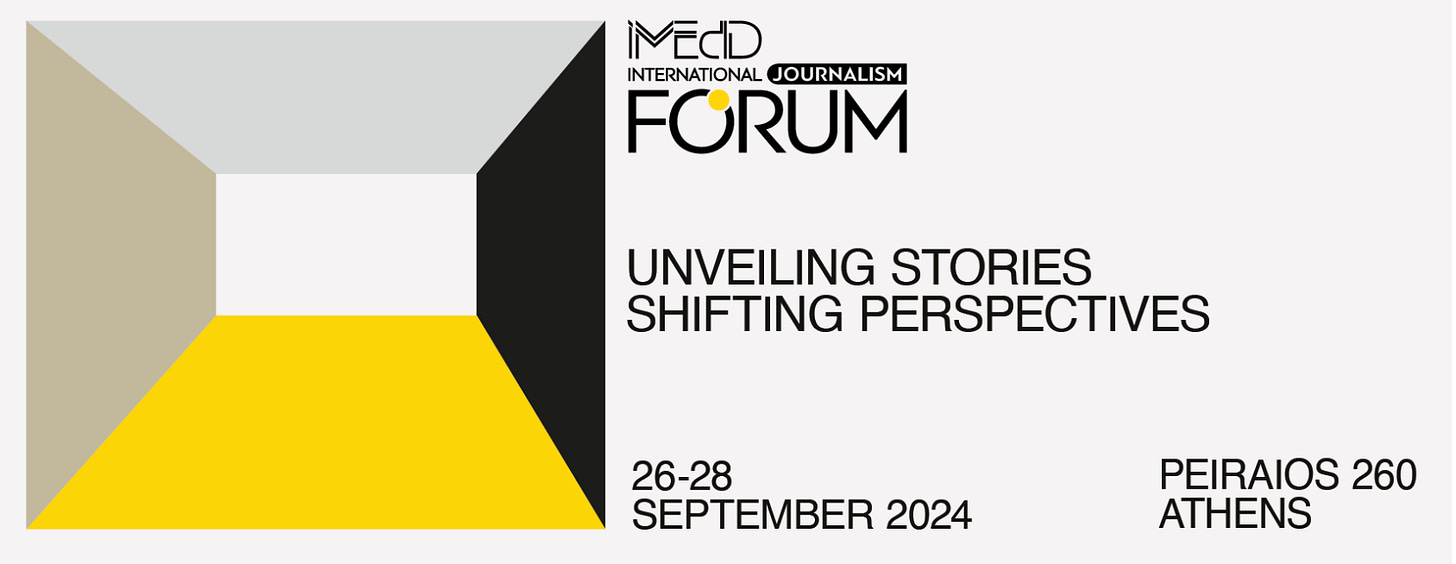Will Google & AI destroy podcasting?
PLUS All the AI lessons from the iMEdD International Journalism Forum 2024
I always think of the people who invented the torch apps for Android 15 years ago. Back then you could buy an app or endure adverts so you could turn your smart phone into a torch. Then one day, without ceremony, Google built a torch option into their OS (as really the apps just turned the camera flash on permanently anyway) and POOF the torch app was obsolete. I hope the guys who created those apps saved their pennies at the time.
In that spirit, I have been coding (with the rather magical Cursor in Python) an AI podcasting app on and off for a while now. In my app, you can give your podcast a name and the hosts personalities and recently I gave it a shiny Streamlit frontend. I presented it the other month when I gave a workshop in AI and Podcasting at Radiodays Asia. Then, in what people have called the company’s “ChatGPT moment”, Google released an incredible service called NotebookLM where you can upload docs, videos and audio and interrogate that information with AI. And one of the side functions of NotebookLM is you can generate chat podcasts from the information you upload.
So, what does that mean for the endless number of chat podcasts that are often two blokes simply talking about information that is right in front of them? Well, it might not kill them off immediately, but it does firmly ask us what we want from our content. If we want complicated information communicated in an audio format then you can do that now with AI.
Up to this point the cost-per-character of a service that generates synthetic voices like Eleven Labs was too high for anyone to go ballistic and cost-effectively create 100s of AI shows. NotebookLM is free and so pushes back against that problem, however, the more existential question is are we comfortable with these chatty AI hosts created by NotebookLM giving us information? Because essentially they are acting as journalists now. They are choosing what to emphasise and how to analyse it, even if the pitch is that they are simply talking about your documents objectively. We already know the bias imbued in these systems and how can we expect them to treat our own documents any differently?
On the positive side these developments may inspire journalists to abandon casual chat and embark on more courageous investigative journalism. On the negative side it may provoke chat podcasters to make more outrageous “hot takes” in order to stand out from the slew of AI generated content. Let’s all hope for the former.
Updates from our WhatsApp Community
GIJN’s Abdulwaheed Sofiullahi wrote about how African journalists are using AI tools (he was kind enough to also interview me for his article).
I really liked this post by Nikita Roy (from the Newsroom Robots podcast) as she lays out her theory on how AI will change media.
What AI was used in creating this newsletter?
Anyone who has asked any LLM to generate a picture about the topic of AI will know you get the most clichéd gunk. For the picture this week I used Midjourney and avoided any mention of AI. But I did use phrases like “hyper realistic photo”, “award-winning photography”, “professional colour calibration”, “morning light” and “sharp focus”. It is a good trick when image generating to not just describe what you can see in the photo, but also the atmosphere and quality of the result.
In the news
The usual line (from AI trainers like me) is that AI is going to help creators and not hinder them. I do believe that, but here is a rather more negative take on how tech is coming for movie production.
The Public Media Alliance (who I have worked with a number of times) is a fantastic organisation that supports public interest media globally. In their podcast Media Uncovered they explore, among other things, how trusted media is under threat. In this recent episode they look at AI. There is plenty to unpack in this episode, including me chatting to Harry Lock (while we were in Malaysia) about what we can expect from AI.
This week’s AI tool for people to use…
The shiny object of the moment is Swarm by OpenAI. Imagine a bunch of AI agents working together, but instead of chaos, Swarm gives them routines to keep everything running smoothly. Swarm is a way to run more complicated processes with AI and an opportunity to start thinking of your company as having an AI workforce rather than access to a few simple chatbots. It is open-source so it’s ripe for community-driven development, which could lead to all sorts of exciting new uses. I’ll be experimenting with Swarm in the coming weeks and all the updates will be in this letter.
3 AI Lessons from the iMEdD International Journalism Forum 2024
Last month I was in Athens at the iMEdD International Journalism Forum to present my investigative podcasting work. A huge thank you has to go to iMEdD for inviting me and putting on an incredible event.
There was also plenty to learn with regards to journalism and AI. Here are the key takeaways:
Daniel Howden, Managing Director of Lighthouse Reports, leads a team that has been investigating the underbelly of algorithms. They have “pursued the holy trinity of algorithmic accountability: the training data, the model file and the code for a system used by a government agency to automate risk assessments for citizens seeking government services.” They published their astounding work in Wired and here is a transparent summary of how they did it.
The wonderful folks at the Center for Collaborative Investigative Journalism (CCIJ) are bringing AI to important investigations around the world. Sotiris Sideris and Carolyn Thompson are using AI to dig through court records on gender based violence and uncover stories that otherwise wouldn’t have been found.
The Spinoza tool by Reporters Without Borders is currently being tested by journalists in France. As was presented by Vincent Berthier at iMEdD the tool will look at a stack of data (articles, legal docs and studies) linked to climate change and help reporters quickly synthesise them into something sensible and useable.
What is happening at Develop AI?
Next, I will be in Belgrade, Serbia for Innovation Days to give a workshop on AI and Podcasting. There is plenty to teach and discuss on this topic.
And then I’ll be heading to Ethiopia to give a training in AI with the formidable Camilla Bath. She is fond of saying that journalism is simply a mechanism to equip people so they can make better decisions. I couldn’t agree more.
See you next week. All the best,
Develop Al is an innovative company that builds AI focused projects, reports on AI and provides training on how to use AI responsibly.
Check out Develop AI’s press and conference appearances.
Look at our training workshops (and how your team could benefit from being trained in using AI).
This newsletter is syndicated to millions of people on the Daily Maverick.
Email me directly on paul@developai.co.za. Or find me on our WhatsApp Community.
Follow us on LinkedIn / Facebook / Instagram / TikTok. Or visit the website.
We are based in Cape Town, South Africa.
Listen to Develop Audio’s investigative podcasts, including Alibi, Asylum and The Last Afternoon In The Garden.
Thank you to all our paid subscribers. For $5 a month you can help support this newsletter (and keep it free for everyone).





